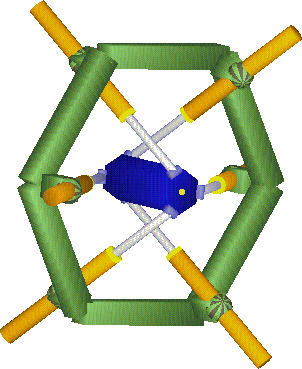 |
|
||||||||||||||||||||||||||||||||||
|
|||||||||||||||||||||||||||||||||||
Optimization of Robots with Parallel Kinematics under Thermal LoadProject Description
In the priority program SPP 1099 funded by the German Research Foundation the behavior and characteristics of robots with parallel kinematics are systematically investigated. One of the important properties of robots is their performance with respect to thermal loads. Especially for robot devices used as machine tools this is a crucial point which is investigated within the research program in a joint work by the Institute for Machine Tools and the Institute of Engineering and Computational Mechanics. The objective of the joint project is the enhancement of the performance of machine tools with parallel kinematics by improving the design with respect to thermal influences on the static and dynamic behavior. In order to reach this objective both, theoretical and experimental means are used in combination. The theoretical investigations are conducted at the Institute of Engineering and Computational Mechanics and include modeling, simulation and optimization of machine tools with parallel kinematics. The theoretical results are continuously verified by measurements carried out at the Institute for Machine Tools. Further, the experimental investigations are used to improve the design of joints and links. For the theoretical investigations the machines are modelled as multibody systems including elastic deformations. Several models of different complexity are developed for machine tools with two--dimensional and three--dimensional workspace. The thermal effects are considered by thermal expansion of the links and temperature dependent stiffnesses. The data for the dependency on the temperature are obtained by comparison of the mechanical model with measurement data. Simulations with these models show the influence of the temperature on the accuracy of the machine tool motion and the need for improvements of the design. Possibilities for an enhancement of the performance of the machines under thermal loading are first implemented in the models. If they prove their effectiveness in the simulations they are realized in the design, and the performance is compared again with measurements. The design parameters are determined by a mathematical optimization process using both, deterministic and stochastic algorithms. The deterministic algorithms need to be extended in order to handle point- and piecewice defined criteria which may lead to discontinuous sensitivities. The stochastic methods are parallelized in order to handle such complex optimization tasks within acceptable computation times. These basic investigations will result in a method for the consideration of thermal effects in elastic multibody systems with application to the machine tools in order to improve their performance, verified by measurements. Publications
Related PagesContact |
| Last modified
15.1.2013 ( |
